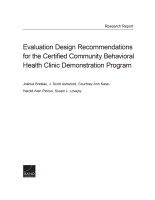| 来源类型 | Research Reports
|
| 规范类型 | 报告
|
| DOI | https://doi.org/10.7249/RR1439
|
| ISBN | 9780833095640
|
| 来源ID | RR-1439-ASPEC
|
| Evaluation Design Recommendations for the Certified Community Behavioral Health Clinic Demonstration Program |
| Joshua Breslau; J. Scott Ashwood; Courtney Ann Kase; Harold Alan Pincus; Susan L. Lovejoy
|
| 发表日期 | 2016
|
| 出版年 | 2016
|
| 页码 | 110
|
| 语种 | 英语
|
| 结论 |
- Enormous variability exists across states in the availability of data that could potentially inform the CCBHC evaluation, including variability in Medicaid claims data, other human services utilization data, and health and social functioning outcomes data.
- The CCBHCs are being implemented at a time when multiple service delivery innovations that target the same or overlapping patient populations are being tested. This context should be taken into account in the design of the evaluation.
- Implementation questions may be addressed through a combination of existing data sources, including documentation of compliance with certification criteria, required quality measure reporting from the CCBHCs and the states, and cost reports. Supplemental data sources, such as quarterly reports from CCBHCs, surveys of providers, or qualitative studies of selected CCBHCs may also prove valuable.
- Impact questions can be addressed through data from Medicaid claims or encounters covered by managed care payments. Detailed analytic plans, including selection of comparison groups, will need to be informed by conditions within demonstration states regarding the delivery system and data availability.
|
| 摘要 |
- We recommend that the evaluation of the CCBHC demonstration project have three components. First, the evaluation should compile profiles of the mental health systems in each of the demonstration states. Second, the implementation questions can be addressed through a mix of existing data sources and supplemental data collection efforts. Third, the impact questions can be addressed primarily through analysis of the claims and encounter data, with additional information drawn from cost reports or, potentially, other state specific data sets.
- The evaluation of the CCBHC demonstration can be efficient by making maximum use of existing data to reduce costs in describing the implementation of the model and its impact on care. The ultimate evaluation design will depend on the data sources available in the eight states selected for the demonstration and the resources available for the evaluation.
- The evaluation has the potential to impact policies in the behavioral health arena in a fundamental way, providing guidance on the value of strengthening and growing the traditional model of CMHCs through expansion of their scope and reform of their financial structure.
|
| 主题 | Community-Based Health Care
; Health Care Program Evaluation
; Mental Health Treatment
; Substance Abuse Treatment
|
| URL | https://www.rand.org/pubs/research_reports/RR1439.html
|
| 来源智库 | RAND Corporation (United States)
|
| 引用统计 |
|
| 资源类型 | 智库出版物
|
| 条目标识符 | http://119.78.100.153/handle/2XGU8XDN/108305
|
推荐引用方式
GB/T 7714 |
Joshua Breslau,J. Scott Ashwood,Courtney Ann Kase,et al. Evaluation Design Recommendations for the Certified Community Behavioral Health Clinic Demonstration Program. 2016.
|
|
文件名:
|
x1495316297015.jpg
|
|
格式:
|
JPEG
|

|
文件名:
|
RAND_RR1439.pdf
|
|
格式:
|
Adobe PDF
|
除非特别说明,本系统中所有内容都受版权保护,并保留所有权利。